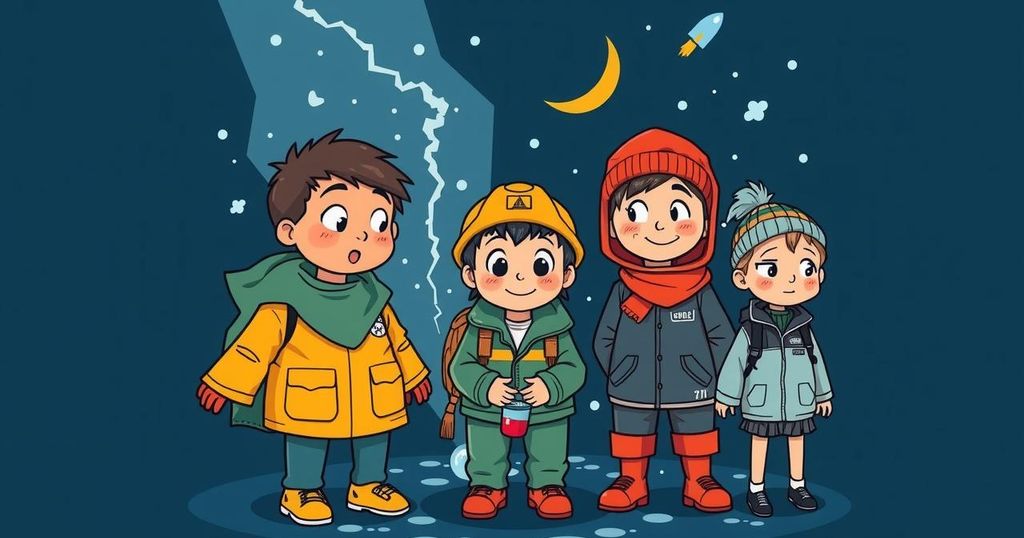Extreme Weather Events Displace Millions of Children Worldwide, Urgent Action Needed
A recent analysis by Save the Children reveals that nearly 300 million children, approximately one in eight globally, have been severely impacted by ten major extreme weather events in 2024. These disasters have forced many to abandon their homes, rely on humanitarian aid, or miss school. As leaders prepare for COP29 in Azerbaijan, there is a pressing need to address children’s unique vulnerabilities in climate discussions.
As the world grapples with the increasing severity of climate change, Save the Children reported that approximately one in eight children globally have been significantly affected by the ten largest extreme weather events of the year. Between January 1 and October 29, 2024, about 300 million children, or 12.5% of the total child population of 2.4 billion, encountered devastating impacts across Asia, Africa, and Brazil. These events compelled many to flee their homes, rely on humanitarian aid, or miss educational opportunities. The extreme weather occurrences included Tropical Storm Trami in the Philippines, which caused school suspensions for 19.5 million children, and a severe drought in Southern Africa, the worst in over a century, affecting 12.2 million children in urgent need of assistance. The flooding in West and Central Africa displaced 10 million children, and an unprecedented heatwave in South Asia forced 256 million children out of school. Moreover, Typhoon Yagi, which struck Southeast Asia this September, left about 1.5 million children requiring humanitarian aid. Children across multiple regions faced similar challenges, underscoring the urgent need for global action to address the unique vulnerabilities these young individuals face in the face of climate change. The escalating frequency and intensity of extreme weather events, now estimated to have increased five-fold in the past 50 years, demands immediate attention from world leaders. As government representatives prepare for the COP29 summit in Azerbaijan, Save the Children urges that the needs of affected children must be prioritized within climate change discussions. Many of the impacted children reside in low- and middle-income countries, where the effects of climate-related disasters are pronounced. Citing personal grief, Kyariyam, a 12-year-old girl displaced by flooding in Nigeria, expressed, “The flood destroyed everything in our home […]. I feel really bad that I’m no longer able to go to school. I constantly worry about how I will catch up.” Similarly, Zinhle, a 14-year-old from Zimbabwe, detailed the severe drought’s impact on her community, lamenting decreased food security and educational access, urging that global solutions be devised to keep children in school. Save the Children has called upon COP29 participants to ensure that children’s rights and voices, along with their unique vulnerabilities, are integrated into climate finance discussions. “Climate change is not just a problem for future generations – it is a current and devastating crisis which this year alone has significantly impacted 1 in 10 of the world’s children,” stated Inger Ashing, CEO of Save the Children International. The necessity of urgent action is imperative to address this child rights crisis.
The article discusses the grave impact of extreme weather events on children amid the ongoing climate crisis. With a focus on recent data from Save the Children, it highlights that a significant number of children globally face dire consequences due to climate-related disasters, urging world leaders to consider their needs and rights during the upcoming COP29 summit. The analysis underscores not only the scale of the issue but also the importance of prioritizing children’s voices in climate action and policy reforms.
The significant impact of extreme weather on children necessitates immediate and robust action from global leaders at COP29. With millions affected and critical educational and humanitarian needs unmet, it is essential to include children’s rights and voices in climate discussions. The urgent call for climate justice emphasizes that this crisis disproportionately affects the most vulnerable, particularly in low- and middle-income countries, highlighting the need for immediate solutions that secure a better future for affected children.
Original Source: reliefweb.int




Post Comment